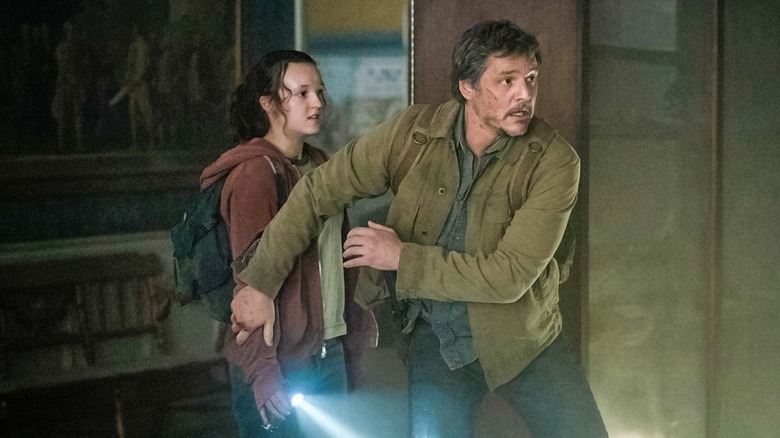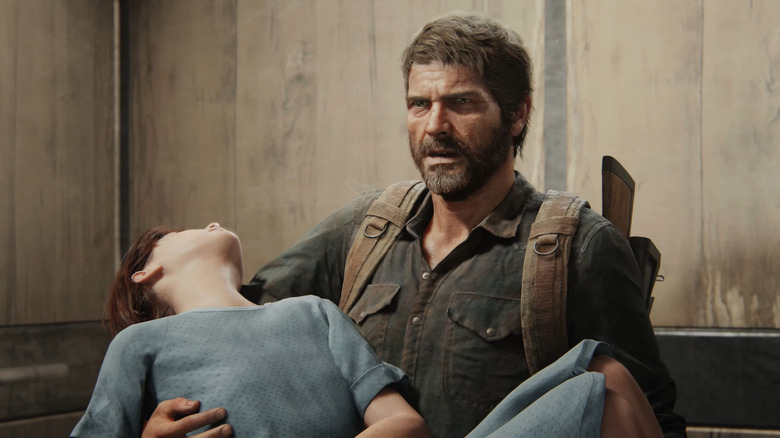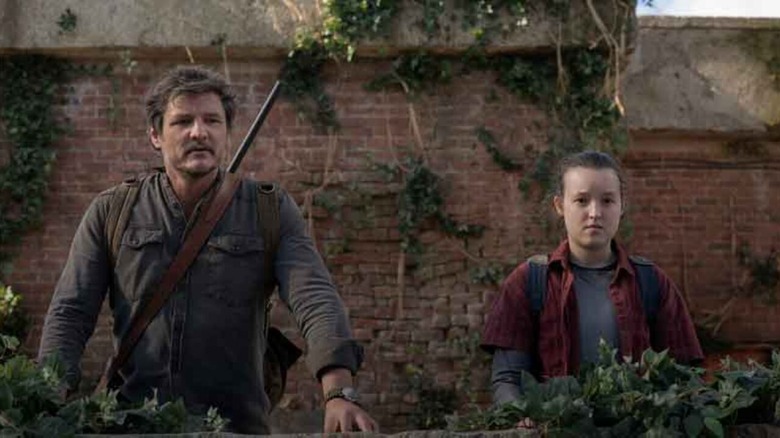One Unseen Last Of Us Character Is An Enigma By Design
The season finale of "The Last of Us" held a lot of surprises, the first of which was the opening flashback to Ellie's birth. We meet Ellie's mother Anna as she gives birth completely alone in an empty house in the middle of nowhere. Well, it turns out Anna's not completely alone, because one of the infected barges through the door while she's in labor. She manages to kill the creature, but not before getting bit. Anna gives birth to Ellie during the attack and quickly cuts the umbilical cord, so the infection doesn't have time to (completely) spread to her child. This is why Ellie's immune: she was briefly exposed to a very small dose of the virus at birth.
It's a fascinating choice for the finale, and not just because the show decided to cast Ashley Johnson (the voice of Ellie in the game) for the role of Anna. Ellie's mom never shows up in the game; she's only alluded to by other characters, and the closest thing we get to interacting with her is through reading the letter she wrote for Ellie right before she died. (Said letter is never included in the show.)
Perhaps the most interesting part, however, is the lack of any father figure for Ellie. Anna's completely on her own when we meet her, and no boyfriend or husband is mentioned in her conversation with Marlene. The implication is that Ellie's father, whoever he is, is no longer part of Anna's life. It's a deliberate choice on the part of the writers; they easily could've included or mentioned Ellie's father at some point, but neither the show nor the game has ever shown any interest in him. So, what's up with that?
Accidentally invoking a certain biblical figure
At first glance, this storytelling choice seems to deliberately invoke the idea of, well, Jesus Christ. He's a figure largely seen as a savior of mankind, someone who was conceived without a human father and typically serves as hope for humanity. The parallels to Ellie — another savior of sorts for mankind, whose biological father doesn't seem to exist as far as viewers can tell — is hard to miss.
Also, we can't help but notice that one of the most striking images in both the game and show is that of Joel carrying an unconscious Ellie out of the hospital, not long after he thought she died from the drowning incident. It's an image that seems awfully reminiscent of the famous sculpture of Mary carrying Jesus's corpse in her arms, after his crucifixion and before his resurrection. The imagery is complicated in "The Last of Us" by the fact that we know Joel's dooming humanity by saving Ellie; Jesus died for our sins, but Joel's refusing to let Ellie do a similar feat. It's still a poignant moment, of course: maybe Ellie is supposed to just represent Joel's salvation, not humanity's as a whole.
None of this was intentional, however. At a press conference attended by /Film's own Ben Pearson, showrunner/game creator Neil Druckmann talked about the decision to exclude Ellie's father from the narrative: "In our calculation and our engineering of the decisions we made of how we picked what we picked [and] how we placed it, that religious iconography for Ellie wasn't in our calculus. That was never a conversation for us."
The actual reason
In the end, Ellie's lack of a real dad has less to do with Jesus and more to do with Joel. Ellie's lack of a father figure in her life makes Joel the perfect figure for her to latch onto, just as Joel's loss of a teenage daughter makes Ellie one of the few people in the world who can force her way into his heart.
"Joel's daughter exists and the whole process is about how difficult it is to let somebody else in when you've closed that door off and nailed it shut forever," co-showrunner Craig Mazin explained. "But Ellie doesn't have any — that door is open. That room has never been occupied. And Joel gets in there almost immediately. I do like that. I like the idea that the room is open and empty, and even we don't know anything about [Ellie's father]."
Throughout the game and show, the character going through the most change is Joel. He's already loved and lost a daughter, so it takes him a long, long time to let his guard down and let himself love Ellie in the same way. Ellie, meanwhile, has far less qualms about letting Joel know how much he means to her, culminating in her choosing Joel over Tommy in "Kin" without any hesitation, even though Tommy's her better choice if sheer survival's what she cares about most.
Ultimately, it's Ellie's willingness to let Joel take on a father-like role in her life that pushes Joel so hard to finally embrace it. The identity of Ellie's father might be a total enigma, one we'll probably never get to unravel, but an enigma is all he really needs to be for "The Last of Us" to work.


